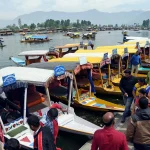A Kashmiri scholar, Abdul Aala Fazili, 33, put behind bars for his write-up published in 2011, has been granted bail in Srinagar.
Additional Sessions Judge, Designated Court Under TADA/POTA/UAPA cases, Jammu, in an order held that Mr. Fazili’s “was a deserving case in which the accused at this stage of the trial should be released on bail”. Family sources confirmed on Thursday that the scholar has reached home from a Jammu jail.
However, the court held that the bail is conditional. Mr. Fazili has been directed to furnish one personal bond of ₹1 Lakh and two surety bonds of like amounts of solvent sureties. The court asked the scholar to attend the nearest police station on a weekly basis and be present in the court on each date of hearing.
“He (Mr. Fazili) shall regularly appear in this Court on each and every date of hearing without fail. He shall not leave the UT of J&K without prior permission of this Court,” the court held.
Mr. Fazili has been asked to surrender his passport before the court. “He shall not involve themselves in any criminal activity leading to registration of fresh FIR, if they do so, their bail shall be treated as cancelled,” the court underlined.
He is also barred from contacting the witnesses in the case, “who are yet to be examined in the Court”. Besides, Mr. Fazili shall furnish the phone numbers to be used while on bail.
Mr. Fazili, who has a Masters in Pharmaceutics and a doctorate from the department of pharmaceutical sciences in Kashmir University, was arrested in April 2022. He was booked for writing an article titled ‘The shackles of slavery will break’, published on November 6, 2011.
According to the police special wing, Special Investigation Agency (SIA), the article was published in 2011 “to build and propagate the false narrative against the Union of India and territorial integrity by seceding J&K and annexing with Pakistan”. The SIA termed the write-up “highly provocative, seditious and intended to create unrest in J&K, to abet the gullible youth to take the path of violence and create communal unrest”.






